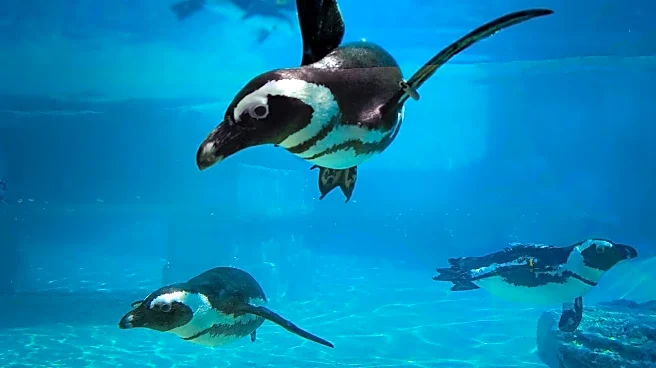What's Happening?
Concerns have been raised over the living conditions of gentoo penguins at the Sea Life London Aquarium. Protesters and British lawmakers have voiced their discontent, calling for government intervention over what they describe as 'un-British' treatment
of the penguins. The aquarium's penguin enclosure, located in a popular tourist area, is criticized for lacking daylight, fresh air, and adequately deep water. Despite the aquarium's assurance that the enclosure meets modern zoo practice standards, activists argue that the conditions do not align with the penguins' natural habitat needs. A campaign to relocate the penguins to a more suitable facility has gained traction, with a petition garnering over 40,000 signatures.
Why It's Important?
The controversy surrounding the penguin enclosure highlights broader ethical and environmental concerns regarding animal captivity. It raises questions about the standards of animal welfare in tourist attractions and the responsibilities of businesses in ensuring humane conditions. The issue has sparked public debate and could influence future policies on animal rights and conservation efforts. The involvement of lawmakers suggests potential legislative action, which could impact the operations of aquariums and zoos across the U.K. and possibly set precedents for similar cases globally.
What's Next?
The campaign to improve the penguins' living conditions is likely to continue, with activists and lawmakers pushing for relocation to a facility that better meets their needs. The aquarium may face increased scrutiny and pressure to enhance its practices. If legislative action is taken, it could lead to stricter regulations on animal welfare in captivity, affecting the operations of similar establishments. The public's response and engagement with the issue may drive further advocacy and awareness campaigns.
Beyond the Headlines
The debate over the penguins' living conditions reflects broader societal values regarding animal rights and ethical treatment. It underscores the tension between commercial interests and conservation efforts, highlighting the need for sustainable and humane practices in tourism. The situation may prompt a reevaluation of how animals are used for entertainment and the ethical implications of captivity. Long-term, it could influence cultural attitudes towards wildlife conservation and the role of human intervention in natural habitats.
















